We didn’t able to complete our planned Markha Valley Trek, but four days stay in Hemis National Park taught us many valuable lessons. On the first day of the trek, we started a bit late, so couldn’t reach to a proper camping site in the night. We were forced to camp and sleep along the edge of the road without having a single drop of water.
Next day, we woke up early, but due to the cold weather, nobody wanted to step-out from the tent. We all were looking at each other, but in reality, nobody was getting ready for the onward journey. Somehow, we started moving forward by 9 AM. Again, there was no chance of breakfast in the absence of water.
Previous day, I couldn’t walk comfortably because of the heavy backpack and everyone else had the similar conditions. We decided to drop some excess stuffs. But, except the food items, there was nothing worthless. I indeed had a lot of food items. To reduce some weight from my backpack, I dropped some 2-3 kgs Gujarati Thepla, that was specially sourced from Gujarat for that trip. I left the packet of Thepla at a corner of the road and moved further.
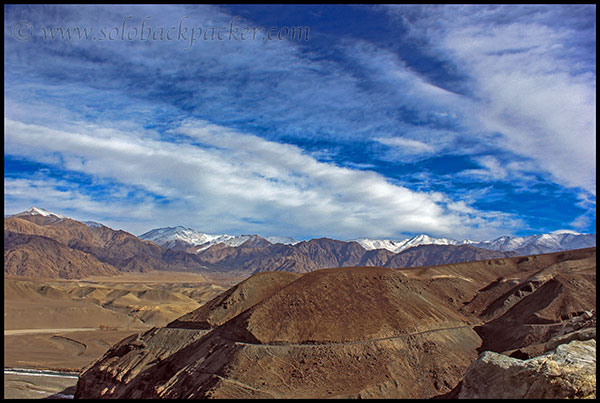
The weather was very good. The sun was perfectly shining in the sky making the day pleasantly warmer. We moved on the paved road, along the deep gorges of Indus river. But, very soon, we started feeling thirsty and tired because of the bright sunlight. Deep down the road, the Indus was flowing with all her majesty. We could see the ample amount of water flowing through the mountain gorges. But, It required a tremendous effort to fetch that water from the river. The river bed was about 200-300 feet below the road, so we had to descend for at least 1 km to fetch the water. After that, there was a steep ascend for about 1 km to return back on the road. And, even there was no guarantee of fetching the water from the river. The frozen ice on the riverbank could have stopped us to reach there. After thinking about all the issues, we decided that rather than descending below to the river bed, it would be better to keep moving on the road. There might be a water source along the road ahead.
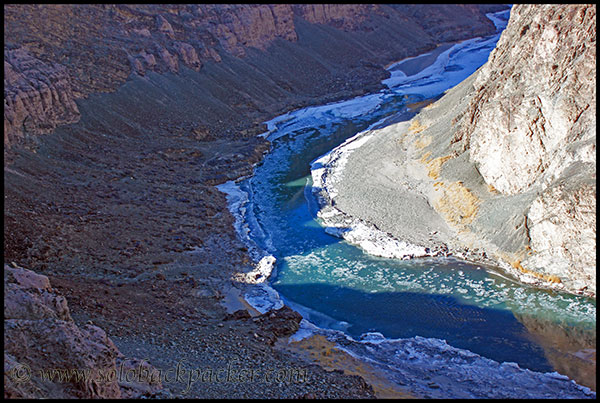
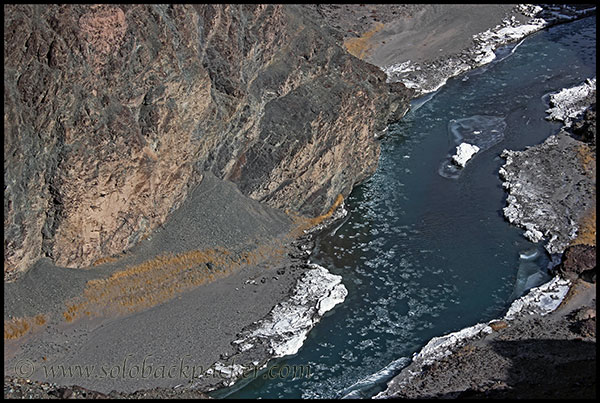
Our backpacks were still heavy. We got tired very soon. Due to the thirst as well as hunger, we couldn’t walk for longer durations and stopped frequently to take some rests at every 200-300 meters. The only good thing available to us was the awesome views of the valley and the mountains after every turn. The high mountains and its snow-covered peaks, the mighty Indus river and its beautiful gorges, a beautiful valley with a clear sky…we were very tired indeed, but there was a solid reason behind our presence in the Hemis National Park. We were enjoying some of the most beautiful moments in our life.
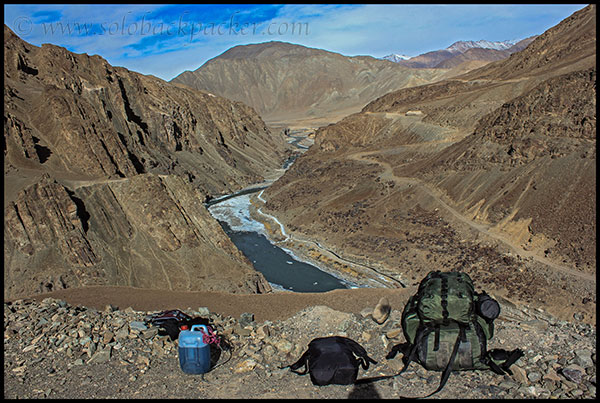
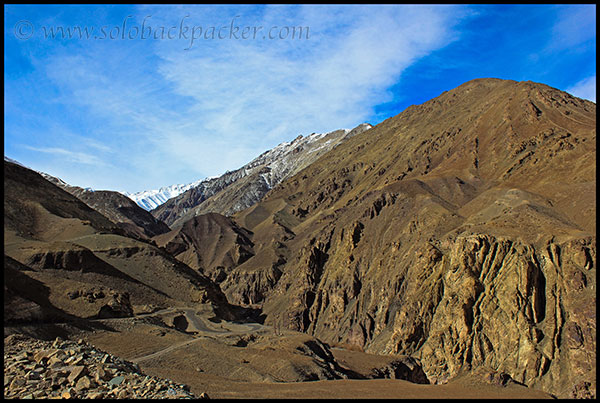
After two hours of walking along the Indus, we said goodbye to the mighty river. Instead of running straight on the mountain ridge, the road was going downhill towards a small mountain stream. A hope for drinking water appeared instantly in the mind. We descended down and walked along that stream. After a short walk, we were able to reach at the riverbank, but to our disappointment, that stream was completely frozen. No trace of water at all. The frozen ice was so hard, that we couldn’t broke that also.
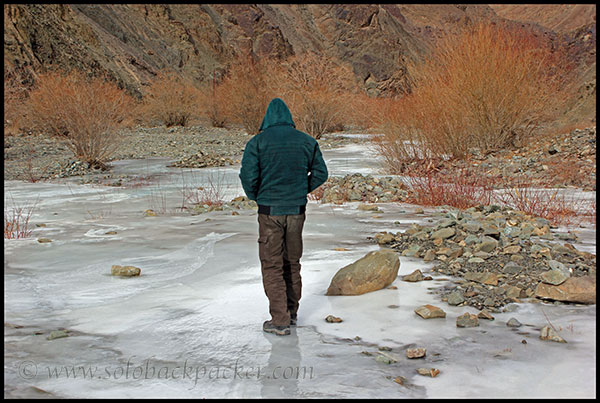
Without any luck, we moved further. Hope was still there to get the water very soon. After another 300-400 meters of walk along the river, we finally saw the precious water flowing through the broken surface of the frozen river. Lot of ashes and remains of the burnt woods were already there, so it looked like an usual picnic spot for many people.
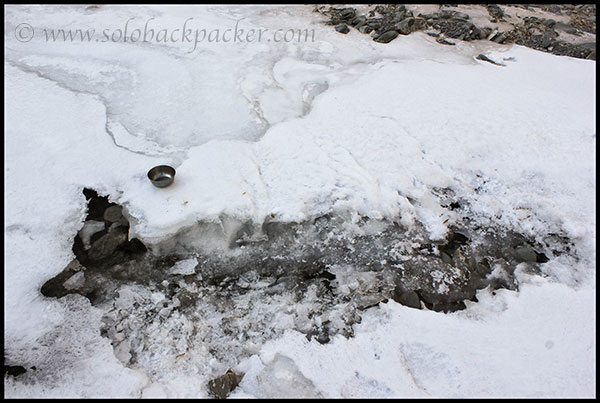
We boiled some water, prepared maggi and tea. When some stuffs went inside our stomach, we felt a lot of relief. We already quenched our thirst with the hot water. After having some food and water, we felt fresh energy in our body. We were ready to move ahead, therefore, collected our things, packed our backpack and started our journey again.
The road was parallel to the small river and not on the much height from the river bed. The completely frozen river wasn’t deep also. We already tested the frozen ice and it was very hard, so there was no fear of cracking. I mean, we found that there couldn’t be a perfect chance to walk on the frozen river bed than that. The horrible experience at the confluence of Indus and Zanskar was still fresh in the memory, so we didn’t have the courage to take more risks. We chanced upon that opportunity and enjoyed our walk on the frozen riverbed. It might not be as enthralling as walking on the Chadar of Zanskar river, but as a beginner, it was a good learning experience. And, I personally think, if a person doesn’t want to take the risk associated with the famous Chadar Trek, he can enjoy his share of adventure on the Rumbak stream. Later, we got many opportunities in Hemis park to walk on the frozen river.
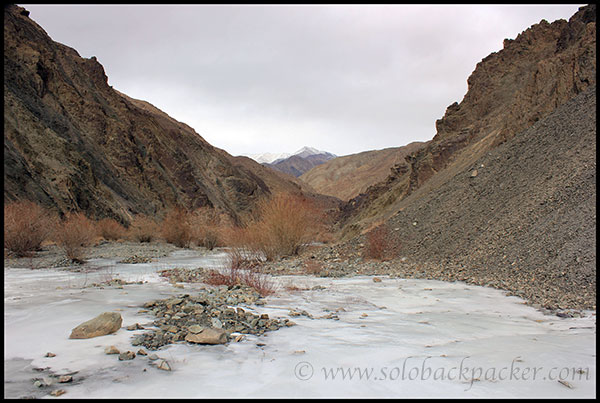
Moving further, we reached at Zingchen village in the afternoon. We found a very nice place to camp for the night. It was a breathtaking sight in the middle of the mountains, with beautiful trees all around and a frozen river at few meters. The camping site was just outside the village. Zingchen is basically a small village with 5-6 houses. Most of the people are involved in the agriculture, and 2-3 houses also work as a homestay.
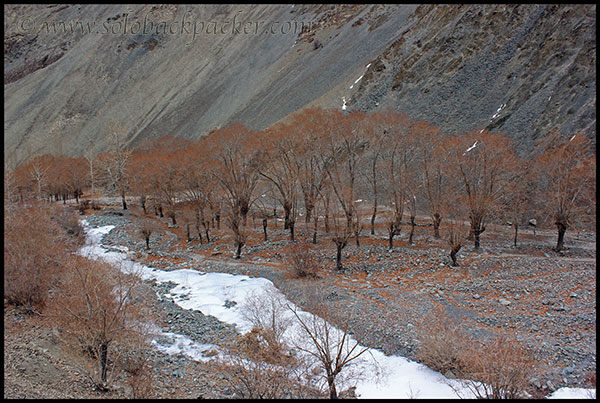
There are two designated camping spot in Zingchen village, develop by the locals. One is just outside the village, where we had reached already and another one was ahead of the village houses near the agricultural fields. At each site, per night camping charge is Rs. 100 for a single tent entitling you to pitch the tent at your preferred place. Someone comes from the village to collect the required fee after you pitched your tents. Both the location are equally good, and you are free to pitch your tent anywhere else apart from these locations. But it’s better to get a prior permission from a village family, otherwise they may object it.
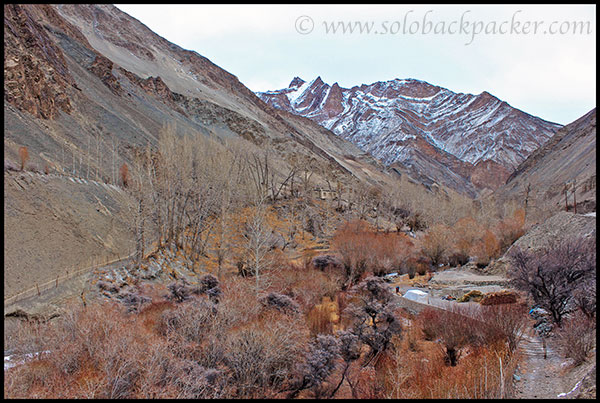
We descended from the main road, crossed the frozen river and reached at our camping site. Nobody was there. We pitched the tent, lit the fire and prepared some soup. Then, a lady come from the village to collect the camping charges. She told us that there are 2-3 home-stays available in the village. In then entire area of Hemis Park as well as Markha Valley, the rate of home-stays are fixed, normally Rs. 800 for a night stay with a breakfast , a lunch and a dinner. They may charge some extra money for hot water facility. When she went back, we decided to have the dinner in a home-stay. After a short duration, an old man from the village came there and when we asked about dinner, he assured that it would be arranged at one of the home-stay.
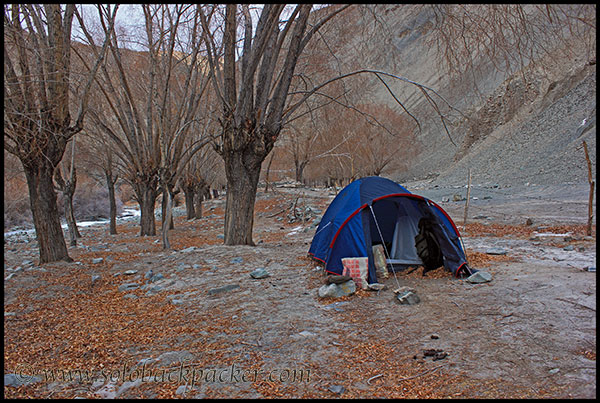
It was getting dark, thus my friends went with that old man to arrange the dinner from a home-stay. I went inside the tent and had a good sleep for one hour. In the evening, we had the dinner at a homestay. They charged us Rs. 300 per person for a simple meal containing rice and dal. After the dinner, we returned back to our camp and slipped inside the sleeping bag. We slept very early due to the day-long tiredness and it concluded our second day in Hemis National Park.
Our plan to trek for 8-days in Hemis and Markha Valley was going to end soon, on the third day itself. But somehow, we stretched that upto five days. On the third day we wanted to reach Rumbak village by the evening. But there was a twist in the tale and we abandoned our plan of trekking to Markha valley. I will cover all those stories in the subsequent posts.
Note: Zingchen Village is easily accessible by a vehicle through a smooth motorable road from Leh. Most of the tourists travel to Zingchen by a car and starts their trek from Zingchen only. We started it from Spituk village, because we had enough time. You have to walk on the main road only, while trekking from Spituk village to Zingchen village. There is no direct and no shortcuts.


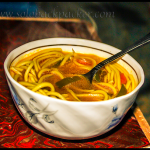
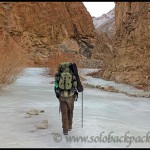
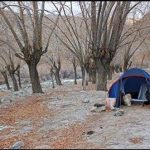
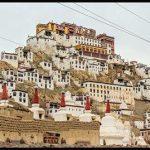
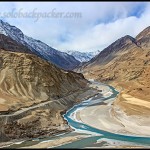
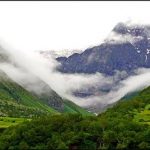
Wow great article. Really love it.
This is really inspiring for the novice backpacker.
Recently I learned that, It is require to get permission to access Hemis national park! Do you recommend getting it prior to plan a trip or can be done from Leh?
Would love to join you incase if you are planning any trip sooner.